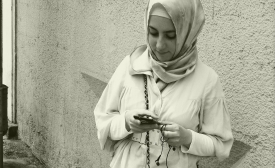The State Department actually has a Twitter account focused on countering some of these jihadis and extremists online and specifically on Twitter. It’s hard to say how effective that is, perhaps it’s better than doing nothing. But we shouldn’t kind of delude ourselves into thinking that public diplomacy can really change people’s minds in a very obvious way. The American government doesn’t have a lot of credibility with anyone who is going to be vaguely sympathetic to the aims of th
Russian officials have responded to a mocking tweet from Canadian delegates over the escalating Ukraine crisis. Diplomatic relations between the two countries have been in the spotlight since Canadian officials posted a snarky map to help Russian soldiers who keep “getting lost in Ukraine”. Moscow officials have hit back with their own map, with the disputed Crimea region clearly marked as Russian territory.
In the past week or so, major social media events have included a funeral, a police shooting, and a beheading. I don't mean to suggest that the ceremony for Mike Brown in Ferguson, the shooting of Kajieme Powell a few miles away, or the Islamic State's beheading of James Foley in Syria were primarily social media events. They are all tragedies, which have taken and shattered lives.
As Scotland's September referendum on independence approaches, groups both for and against separation from the United Kingdom are making efforts to appeal to undecided voters. But one particular advertisement has caused a fury of commotion online. Scottish Twitter users had mostly negative initial reactions to the advertisement, which was widely considered condescending and outdated.
The Zara T-shirt called the “Sheriff” went on sale online at 2 a.m., London time, on Wednesday. Within a few hours, it had sparked a social media outcry, with many Twitter posts accusing the clothing company of anti-Semitism — or at least a large measure of insensitivity. The shirt, meant for children, bore a striking resemblance to the top of a Nazi concentration camp uniform.

Philip Seib encourages public diplomats to read the comments section.
At first glance, it seems obvious -- of course Twitter and YouTube have the right to take down a video showing the American journalist, James Foley, being beheaded. The question is why taking it down is controversial at all. The answer, I think, shows how important services like Twitter have become, and how this has thrust unexpected responsibilities onto them.
Google “Kosovo”, and Petrit Selimi knows exactly what you’re going to see: dry, diplo-speak scouting reports at best, and depressing references to past conflicts at worst. It’s not exactly the promotional buzz a fledgling country with sights set on global integration would hope for.







